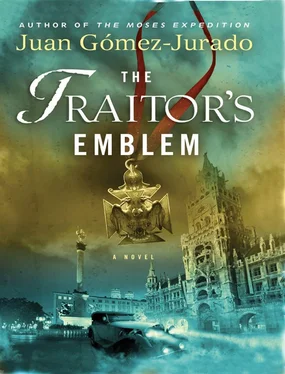Juan Gomez-Jurado - The Traitor's emblem
Здесь есть возможность читать онлайн «Juan Gomez-Jurado - The Traitor's emblem» весь текст электронной книги совершенно бесплатно (целиком полную версию без сокращений). В некоторых случаях можно слушать аудио, скачать через торрент в формате fb2 и присутствует краткое содержание. Жанр: Триллер, на английском языке. Описание произведения, (предисловие) а так же отзывы посетителей доступны на портале библиотеки ЛибКат.
- Название:The Traitor's emblem
- Автор:
- Жанр:
- Год:неизвестен
- ISBN:нет данных
- Рейтинг книги:4 / 5. Голосов: 1
-
Избранное:Добавить в избранное
- Отзывы:
-
Ваша оценка:
- 80
- 1
- 2
- 3
- 4
- 5
The Traitor's emblem: краткое содержание, описание и аннотация
Предлагаем к чтению аннотацию, описание, краткое содержание или предисловие (зависит от того, что написал сам автор книги «The Traitor's emblem»). Если вы не нашли необходимую информацию о книге — напишите в комментариях, мы постараемся отыскать её.
The Traitor's emblem — читать онлайн бесплатно полную книгу (весь текст) целиком
Ниже представлен текст книги, разбитый по страницам. Система сохранения места последней прочитанной страницы, позволяет с удобством читать онлайн бесплатно книгу «The Traitor's emblem», без необходимости каждый раз заново искать на чём Вы остановились. Поставьте закладку, и сможете в любой момент перейти на страницу, на которой закончили чтение.
Интервал:
Закладка:
“Yes, and that reminds me: this morning I had to do it all on my own,” said the shopkeeper, annoyed. “You can’t imagine how hard it was. And on a Friday! Two hours from now, the shop’s going to be heaving.”
“I know, sir. And we have to do everything we can to get rid of all the stock today. This afternoon I’m going to talk to several of our customers, offering them merchandise in exchange for work, because the work has to be done on Monday. On Tuesday morning we’ll go through a municipal inspection, and on Wednesday we open.”
Ziegler looked as though Paul had asked him to smear his body with jam and walk naked across Marienplatz.
“Absolutely not. This shop has been here for seventy-three years. My great-grandfather started it, and then passed it on to my grandfather, who passed it on to my father, who eventually gave it to me.”
Paul saw the alarm in the shopkeeper’s eyes. He knew he was one step away from being fired for insubordination and insanity. So he decided to go all in.
“That’s a lovely story, sir. But regrettably, in a fortnight, when someone whose surname isn’t Ziegler gets hold of the shop at a creditors’ meeting, all that tradition will count for shit.”
The shopkeeper raised an accusing finger, ready to scold Paul for his language, but then remembered the situation he was in and collapsed into a chair. His debts had been accumulating since the beginning of the crisis-debts that, unlike so many others, hadn’t simply vanished in a puff of smoke. The positive side of all the madness-for some people-was that those with mortgages with interest rates that were calculated annually had been able to settle them quickly, given the wild fluctuation of the mark. Unfortunately, those like Ziegler who had committed a share of their income, not a fixed amount in cash, could only end up losing.
“I don’t understand, Paul. How is this going to save my business?”
The young man brought him a glass of water, then showed him an article he had torn from the previous day’s newspaper. Paul had read it so many times that the ink had become smudged in places. “It’s an article by a university professor. He says that at a time like this, when people can’t rely on money, we have to look to the past. To the time before money. To bartering.”
“But…”
“Please, sir, give me a moment. Unfortunately no one can go around trading a bedside table or three bottles of spirits for other things, and the pawnshops are overflowing. So we have to take refuge in promises. In dividends.”
“I don’t understand,” said the shopkeeper, who was beginning to feel dizzy.
“Stocks, Herr Ziegler. The stock exchange will rise out of this. Stocks will replace money. And we’ll be selling them.”
Ziegler gave in.
Paul barely slept for the next five nights. Convincing tradesmen-carpenters, plasterers, cabinetmakers-to take products away for free this Friday in exchange for working over the weekend wasn’t difficult in the least. In fact, some were so grateful that Paul had to offer his handkerchief more than once.
We must be in a real mess when a sturdy plumber bursts out crying when you offer him a sausage in exchange for an hour’s work, he thought. The main difficulty was the bureaucracy, but even in this respect Paul was lucky. He’d studied the guidelines and regulations the civil servants had brought to his attention until he had clauses coming out of his ears. His biggest fear was that he would come across some phrase that would dash all his hopes to the ground. After scribbling down pages and pages of notes in a little book in which he puzzled out the steps that needed to be taken, the requirements for the creation of Ziegler Bank had come down to two:
1) The director had to be a German citizen aged over twenty-one.
2) A guarantee of half a million German marks had to be deposited at the offices of the town hall.
The first was simple: Herr Ziegler would be the director, although it was already quite clear to Paul that he should remain closed away in the office as much as possible. As for the second… a year earlier, half a million marks would have been an astronomical sum, a way of ensuring that only people who were solvent could start a business that relied on trust. Today, half a million marks was a joke.
“Nobody has updated the figure!” cried Paul, leaping around the shop, startling the carpenters, who had already begun to tear the shelves off the walls.
I wonder whether the civil servants wouldn’t prefer a couple of hams, thought Paul, amused. At least they could put them to some use.
23
The truck was open, and the men traveling in the back had no protection from the night air.
Almost all of them were silent, focusing on what was about to happen. Their brown shirts barely kept out the cold, but that didn’t matter, as they would soon be on the move.
Jurgen crouched down and started beating the metal floor of the truck with his cudgel. He’d acquired this habit on his first outing, when his comrades still regarded him with some skepticism. The Sturmabteilung, or SA-the Nazi party’s “storm troopers”-was composed of hardened ex-soldiers, people from the lowest classes who could barely read a paragraph aloud without stammering. Their first response to the appearance of this elegant young man-the son of a baron, no less!-was rejection. And when Jurgen had first used the floor of the truck as a drum, one of his companions had given him the finger.
“Sending a telegram to the baroness, eh, boy?”
The rest had laughed nastily.
That night he’d felt ashamed. Tonight, however, as he began to strike the floor, all the others were quick to follow him. The rhythm was slow at first, measured, distinct, the blows perfectly synchronized. But as the truck approached its target, an inn close to the central train station, the pounding grew until it was deafening, a roar of noise that filled them all with adrenaline.
Jurgen smiled. It hadn’t been easy to win their trust, but now he felt he had them all in the palm of his hand. When almost a year earlier he had first heard Adolf Hitler speak and insisted on a party secretary filling in his membership to the Nationalist Socialist German Workers’ Party then and there, Krohn had been delighted. But when, a few days later, Jurgen had applied to join the SA, that delight had turned to disappointment.
“What the hell do you have in common with those brown gorillas? You’re intelligent; you could have a career in politics. And that patch on your eye… If you start the appropriate rumors, you could make that your calling card. We can say you lost your eye defending the Ruhr.”
The baron’s son paid him no attention. He had joined the SA on impulse, but there was a certain subconscious logic to what he had done. He was attracted to the brutality inherent in the Nazis’ paramilitary wing, their pride as a group and the impunity for violence that this offered him. A group into which he hadn’t fitted to begin with, and where he had been the target of insults and jibes such as “Baron Cyclops” and “One-Eyed Pansy.”
Intimidated, Jurgen had put aside the thuggish attitude he’d assumed with his school friends. These were real tough guys, and they’d have closed ranks immediately if he’d tried to gain anything by force. Instead he had won their respect bit by bit, demonstrating his lack of scruples each time they, or their enemy, had a meeting.
A squeal of brakes drowned out the violent sound of the cudgels. The truck stopped abruptly.
“Get out! Get out!”
The storm troopers crowded together at the back of the truck. Then twenty pairs of black boots tramped over the wet paving stones. One of the storm troopers slipped into a puddle of dirty water, and Jurgen hastened to offer him an arm to help him up. He’d learned that gestures like this would win him points.
Читать дальшеИнтервал:
Закладка:
Похожие книги на «The Traitor's emblem»
Представляем Вашему вниманию похожие книги на «The Traitor's emblem» списком для выбора. Мы отобрали схожую по названию и смыслу литературу в надежде предоставить читателям больше вариантов отыскать новые, интересные, ещё непрочитанные произведения.
Обсуждение, отзывы о книге «The Traitor's emblem» и просто собственные мнения читателей. Оставьте ваши комментарии, напишите, что Вы думаете о произведении, его смысле или главных героях. Укажите что конкретно понравилось, а что нет, и почему Вы так считаете.












